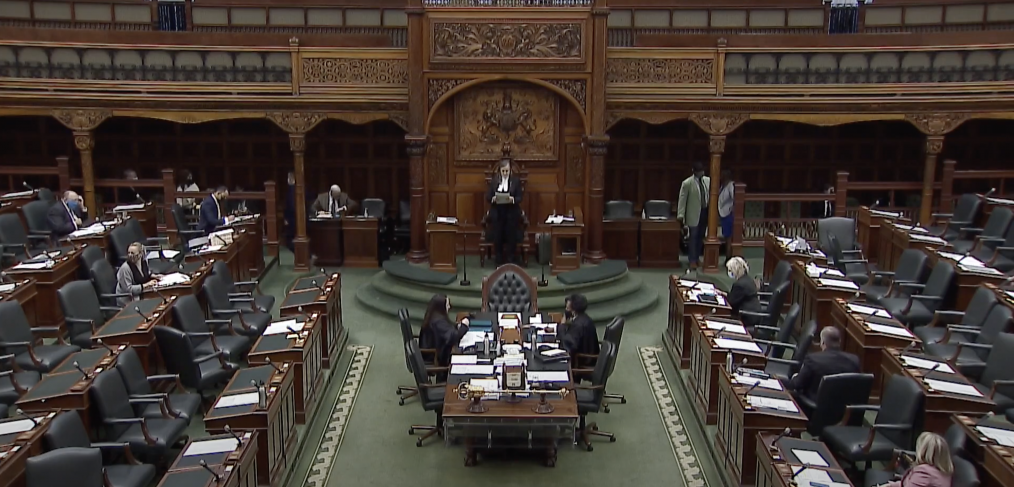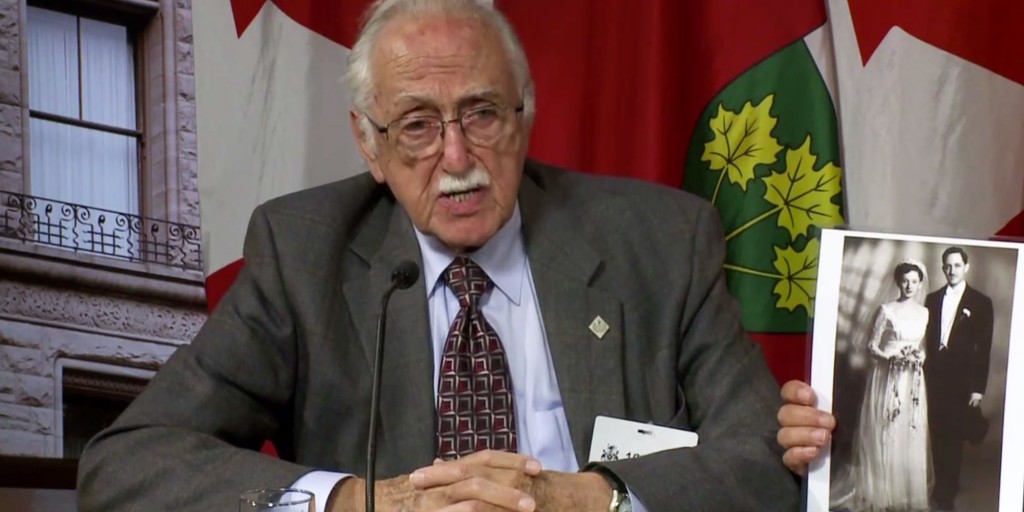
This is a cautionary tale regarding the socio-economic relationship between the Government of Ontario and its more than two million seniors. The recent Brexit debacle is an example of what can happen when governments ignore for too long the underlying rights and needs of a large segment of the electorate.
For more than twenty years, the governments of Ontario have overlooked a fundamental right of seniors, and recently, an “Expert Advisory Panel,” appointed by Charles Sousa, Minister of Finance, did not address this most important financial issue, thereby, perpetuating the problem. The Panel submitted a report that again did not take into account the significant financial benefits that could be available to seniors through life insurance settlements. The report is titled: Review of the Mandates of the Financial Services Commission of Ontario, Financial Services Tribunal, and the Deposit Insurance Corporation of Ontario.
Life insurance settlements are a significant part of financial sectors in countries around the world and the benefits of a well-regulated, secondary market for life settlements has been evident for decades. Today, life settlements are available to seniors in the US and other countries, and some Canadian provinces, but not in Ontario. It is truly unfortunate that this Panel chose not to even mention the issue. This is particularly important to seniors because the insurance industry, through the Canadian Life and Health Insurance Association (CLHIA), has lobbied for years to prevent seniors having access to the fair market value of their life insurance policy in a well-regulated secondary market. And the CLHIA continues this unfair practice, including supporting new preventive legislation in other provinces (e.g., Saskatchewan).
The Life Insurance Settlement Association of Canada, an advocacy group for seniors, is, needless to say, very disappointed in the report by the Panel, which was appointed in 2015. As part of the Panel’s review process, we made an in depth submission (June 2015), attended a meeting with the Panel (July 2015), and provided a detailed response to the Panels “Preliminary Report” (November 2015). We set out, in considerable detail, the problem, the solution and the benefits to seniors and the taxpayers. And still, the Panel ignored the issue.
Conspicuous by its absence
Nowhere in the Panel’s 92-page report was there a comment on life settlements, which should be an integral part of any review of Ontario’s financial sector. We have set out below the essence of the issue and problem and how life settlements could make a significant contribution to Ontario seniors’ financial well-being:
- Over a million Canadian seniors are living in poverty and/or working beyond retirement age because they need to.
- Over half of Canadian seniors own a life insurance policy.
- In jurisdictions around the world, a life insurance policy is considered an asset and can be sold for fair market value in well-regulated secondary markets.
- A life settlement allows a policy owner to receive, on average, more than four-times the value they would receive from the insurance company, including term insurance which receives no cash value from the insurer.
- In the United States, seniors receive more than $7 million a day from life settlements in a well-regulated industry.
- In 2000, the Harris Conservative government passed legislation to repeal Section 115 of the Ontario Insurance Act, which is the regulation that prevents life settlements. It was never enacted by the Financial Services Commission of Ontario (FSCO) whose mandate was reviewed by the Panel.
- The Panel ignored an issue that goes to the fundamental rights of seniors to have access to the fair market value of an asset that they own?
Good report but a serious omission
We submit that although the majority of the Report is well done, the absence of any responsible insight and recommendations regarding the role of life settlements in a “modernized” Ontario financial sector is a serious omission. There are many statements and opportunities in the report where the Panel could have, and should have, commented on life settlements.
Two key statements:
Let us begin with two statements:
- A statement by Sun Life supports our case that a life insurance policy is an asset to be considered like all other “fixed-income investments;” therefore, life insurance settlements should be part of any mandate that reviews the financial sector and the government agencies that oversee it. “A recent analysis by Wayne Miller and Sally Murdock of Sun Life Financial conclude that permanent life insurance, specifically participating whole life, is in fact and attractive alternative asset class when compared against fixed-income investments.”
- An overarching statement by the Panel that goes to the heart of the matter: Appendix E, page 84, 4a: The Panel states: “In the context of financial services, FSRA [Financial Services Regulatory Authority] should be directed to provide strong and effective consumer protection while fostering a strong, innovative, vibrant and competitive financial services sector.”
LISAC believes that the intent in this statement cannot be achieved in Ontario if there is no secondary market in which seniors can access the fair market value of their life insurance asset, and have the right to sell it in an open and well-regulated life settlement industry. Without this, consumers cannot have a “competitive financial services sector.” The fact that the Panel did not address this most important category of financial assets is a travesty.
Further comments on Report’s content:
- Covering letter: The Panel mentions in its covering letter that they expect their recommendations to be “… supported broadly.”
We suggest that if Ontario seniors were to understand what has not been addressed relative to their financial well-being that broad support would diminish significantly among the more than two million Ontario seniors.
- Page 1: The Panel references creating “… a modern, responsive and effective regulator.” They further state: “Our recommendations were prepared with both the present and the future in mind, and in light of industry and regulatory trends here and worldwide.”
The Panel need look no further than the Unites States to see how a “modern, responsive and effective regulator … and regulatory trends here and worldwide,” include a secondary market for life settlements. We ask: Did they thoroughly assess the life settlement industry in the United States, which has been operating as a well-regulated industry for more than two decades?
- Page 11: The Panel states: “We believe our final 44 recommendations, detailed in the next section, would be beneficial for industry, consumers, investors and pension plan beneficiaries alike.”
How can the Panel make such a statement while ignoring the evidence that so clearly supports the value and benefits of life settlements?
- Page 15: The Panel states: “It should be made clear that, in its role as regulator of financial services, FSRA should strike an appropriate balance between the protection of consumers and the needs of the financial services sectors.”
There is no “appropriate balance” for consumers if they cannot access the fair market value for an asset that they own. In fact, the balance is seriously skewed to the life insurance companies who oppose a well-regulated life settlement industry because it would place considerable funds in seniors’ bank accounts instead of the insurance companies’ accounts.
- Page 17: The Panel states: “… enable it to protect consumers and pension plan beneficiaries, and thus maintain confidence in the financial services and pensions sectors.”
LISAC contends that “Protection of consumers … and confidence in the financial services” cannot be achieved if consumers do not have access to a secondary market where they can receive fair market value for the life insurance asset (an asset as acknowledged by Sun Life).
- Page 18, Recommendation 7: “FSRA’s mandate should be informed by the OECD’s G20 High-Level Principles. We kept these principles in mind as we developed the recommendations throughout this report.”
LISAC suggests that one of the principles the Panel cites is not applied, in part, in the report. “Competitive markets and products, innovation and service quality … the focus on consumers and pension plan beneficiaries must be achieved while simultaneously fostering a strong, vibrant and competitive financial services sector and a strong and sustainable pension system.”
This principle, as it applies in many other jurisdictions, includes life settlements as part of a “strong, vibrant and competitive financial services sector.” Why shouldn’t Ontario’s market economy have the same benefits.
- Page 19, Recommendation 8: “FSRA should be required to develop, seek public comment…. In order to bolster and maintain confidence among consumers, investors and pension plan beneficiaries …. FSRA should seek public input regarding its priorities and regulatory approach.” “Without a voice of the consumer, there is no reasonable expectation that the consumer’s needs will be identified…” – McBride Bond Christian LLP
LISAC, advocating on behalf of the consumer, specifically seniors, made full representations to the Panel (two written submissions and attendance at a “roundtable”), but we can only conclude that our voice about seniors’ financial needs and the need for Ontario to establish open, fair and well-regulated markets was either: i) not heard or ii) ignored. Why?
Throughout the report the authors inserted and highlighted numerous supportive comments from participating organization; however, failed to include any non-supportive, comments such as the constructive information and insights submitted by LISAC.

Honourable Mitzie Hunter, Minister of Education , Government of Ontario
Now, with CPP adjustments made by the federal government and there no longer being a need for Ontario to focus on developing pension plans, the Honourable Mitzie Hunter has moved from being Associate Minister of Finance to Minister of Education. But we suggest the focus on seniors’ financial retirement needs still requires special ministerial responsibility. The Government of Ontario needs the same focus and resources Ms. Hunter brought to pensions to now be directed to investigating and assessing the value and benefits that can be derived by establishing a well-regulated secondary market for life insurance settlements. In the end, this is for the benefit of Ontario seniors and the Ontario economy.
The big question:
How long, and how many “expert panels” are required, before common sense and pragmatism prevail and the Government of Ontario recognizes that Ontario seniors deserve what millions of seniors in other jurisdiction have, a well-regulated, life settlement industry?
 It should not take another fifteen years to fulfill the intention of the Harris Government in 2000, and if it does, we would point to the Brexit phenomenon as a cautionary tale for the Government of Ontario. Of Ontario’s more than two million seniors, 75% will vote in the next election.
It should not take another fifteen years to fulfill the intention of the Harris Government in 2000, and if it does, we would point to the Brexit phenomenon as a cautionary tale for the Government of Ontario. Of Ontario’s more than two million seniors, 75% will vote in the next election.
Submitted on behalf of:
Leonard H. Goodman
Founder and Chair
June 29, 2016



 I have been advocating for seniors on the life settlement issue for five years: talking with, writing to, meeting with elected officials, government agencies, insurance companies, insurance agents, the media and advocacy groups who purport to put seniors’ best interests first. I’ve also written a book about it, Why Are Canadian Seniors Worth More Dead Than Alive? What Canadian life insurers do not want you to know about life settlements and the hidden value in your policy.
I have been advocating for seniors on the life settlement issue for five years: talking with, writing to, meeting with elected officials, government agencies, insurance companies, insurance agents, the media and advocacy groups who purport to put seniors’ best interests first. I’ve also written a book about it, Why Are Canadian Seniors Worth More Dead Than Alive? What Canadian life insurers do not want you to know about life settlements and the hidden value in your policy. Government
Government


 It should not take another fifteen years to fulfill the intention of the Harris Government in 2000, and if it does, we would point to the Brexit phenomenon as a cautionary tale for the Government of Ontario. Of Ontario’s more than two million seniors, 75% will vote in the next election.
It should not take another fifteen years to fulfill the intention of the Harris Government in 2000, and if it does, we would point to the Brexit phenomenon as a cautionary tale for the Government of Ontario. Of Ontario’s more than two million seniors, 75% will vote in the next election.